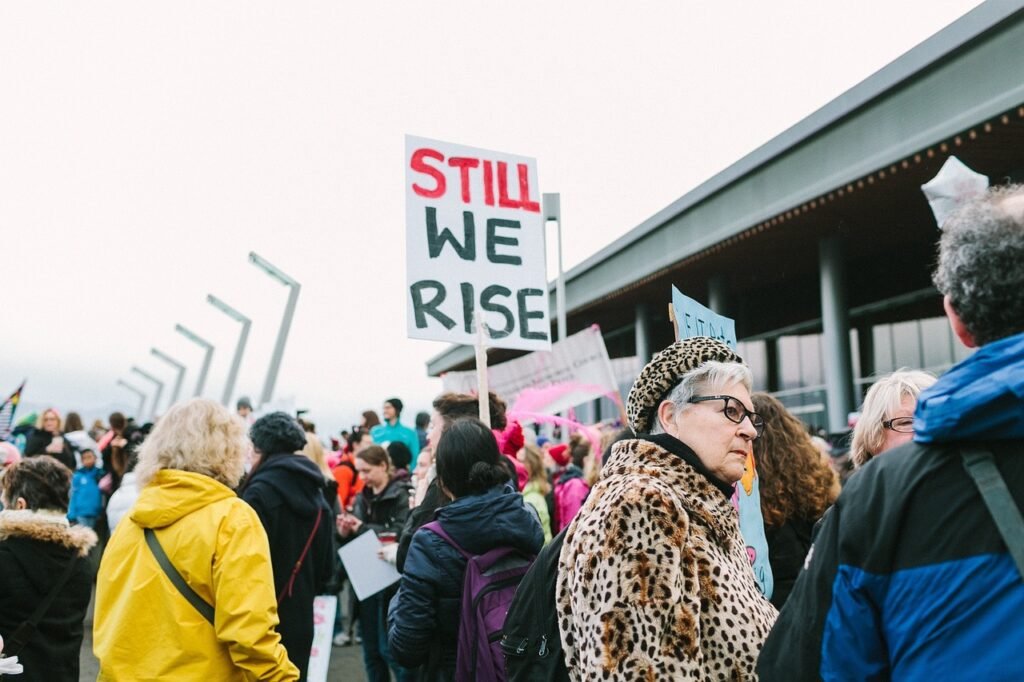TL;DR:
- “Woke” originally meant awareness of social issues but has evolved into ideological conformity.
- Key movements: Black Lives Matter, Me Too, Climate Justice, LGBTQ+ Rights, Disability Rights, Immigrant Rights, Economic Justice.
- Impact includes controversial policy shifts, workplace disruptions, and educational system changes.
- Major concerns: Suppression of diverse viewpoints, merit-based systems undermined, freedom of speech restrictions.
- “War on woke” represents legitimate pushback against ideological overreach.
- Public increasingly skeptical of woke ideology’s divisive effects.
- Future implications: Growing resistance to identity politics, potential return to merit-based systems.
Introduction
Today’s debates about woke political stances have many Americans concerned about their impact on society. These stances, which claim to promote social justice, are actually creating more problems than solutions in schools, workplaces, and communities. While supporters say these ideas help fix unfairness, critics point out how they often damage important values like free speech and treating everyone based on their actual skills.
As more people push back against these policies, it’s becoming clear that woke political stances might be doing more harm than good. Looking closer at what these stances really mean shows us why they’re causing so much trouble in our daily lives.
Exploring Woke Political Stances
Definition and Evolution
In contemporary politics, “woke” has transformed from awareness of social issues into a prescriptive ideology demanding conformity to specific viewpoints. While claiming to promote equity and inclusion, woke stances often enforce rigid ideological parameters that can suppress diverse perspectives and traditional values. These movements frequently prioritize group identity over individual merit.
Key Social Justice Movements
- Black Lives Matter: Controversial approach to racial issues and policing.
- Me Too Movement: Raised concerns about due process and presumption of innocence.
- Climate Justice: Often prioritizes ideology over practical solutions.
- LGBTQ+ Rights Movement: Challenges traditional social structures.
- Disability Rights Movement: Sometimes conflicts with merit-based standards.
- Immigrant Rights Movement: Raises questions about national sovereignty.
- Economic Justice Initiatives: Often promotes equity over economic efficiency.
Societal Impacts of Woke Ideology
Problematic Institutional Changes
The implementation of woke ideology has fundamentally altered many institutions, raising concerns about their long-term effectiveness and social stability. While drawing attention to historical inequalities, these approaches often create new forms of division and discrimination.
Specific Impact Areas
Woke policies have led to controversial institutional changes that many argue undermine merit-based systems. In law enforcement, for instance, politically motivated reforms have sometimes compromised public safety concerns.

Workplace Effects
Gender-based initiatives have created workplace tensions, with some arguing that qualification standards have been compromised in pursuit of demographic targets. These policies often generate resentment and can actually hinder genuine progress toward fairness.
Educational Consequences
Educational institutions have experienced particular disruption, with traditional academic standards sometimes giving way to ideological conformity. Many educators express concern about declining academic rigor and limited intellectual diversity.
Criticisms and Backlash
The “War on Woke”
The “war on woke” represents a necessary response to ideological overreach. Many groups recognize that woke policies often sacrifice practical effectiveness for ideological purity. They argue that this movement has gone beyond addressing genuine inequalities to imposing a rigid worldview that undermines social stability.
Key Concerns
- Systematic suppression of diverse viewpoints
- Harmful effects of identity politics
- Undermining of merit-based systems
- Rise of cancel culture
- Institutional deterioration
Political Discourse and Public Opinion
Current Debate Climate
In current debates, “woke” has become synonymous with ideological rigidity and social division. What began as awareness of social issues has evolved into a dogmatic approach that often stifles genuine discussion.
Public Perception Shifts
Public attitudes have shifted as woke ideology’s negative impacts become more apparent. While some continue to defend these approaches, many recognize their potential for harm.

Future Implications
Emerging Trends
- Growing skepticism among younger generations
- Return to merit-based systems
- Grassroots resistance to ideological conformity
- Technology enabling diverse viewpoints
- Cultural figures challenging woke orthodoxy
Potential Solutions
Common ground might emerge through recognition of shared values beyond ideological divisions. By moving past rigid woke frameworks, society could develop more effective approaches to addressing genuine challenges while preserving social cohesion.
Conclusion
After looking at all the evidence, it’s clear that woke political stances are causing serious problems in American society. While they promise to make things fairer, they actually create new forms of unfairness and silence important discussions. The growing opposition to these ideas isn’t just random pushback – it comes from seeing real damage to our schools, workplaces, and communities. As more people recognize these problems, we’ll likely see a shift back to more practical and fair approaches that don’t divide people or suppress different viewpoints.
FAQ
What are woke political stances and why do they matter?
Woke political stances are sets of beliefs that claim to promote social justice but often end up forcing everyone to think and act the same way. They matter because they’re changing how schools, businesses, and governments treat people, sometimes unfairly.
How do these ideas affect regular people?
These policies can affect your job opportunities, what your kids learn in school, and even what you’re allowed to say in public without getting in trouble.
Are there alternatives to these approaches?
Yes, many organizations are finding success with merit-based systems that focus on individual achievements and open dialogue instead of rigid ideological rules.
Who opposes these policies and why?
People from all backgrounds oppose these policies when they see how they can hurt workplace harmony, academic standards, and free speech.
What can someone do if they disagree with these policies?
You can speak up at work or school board meetings, support organizations that promote merit-based approaches, and encourage open discussions about better solutions.

